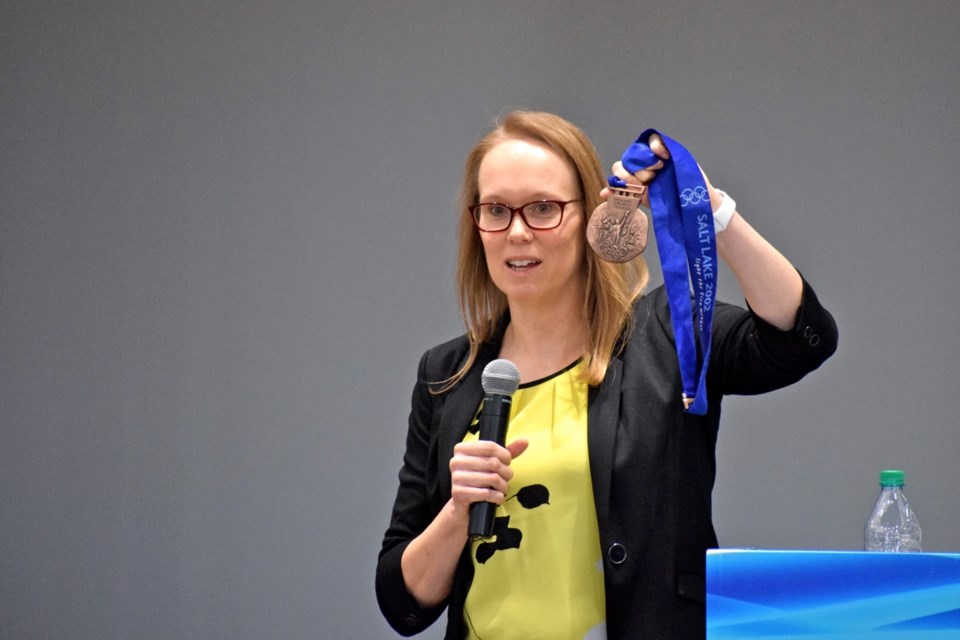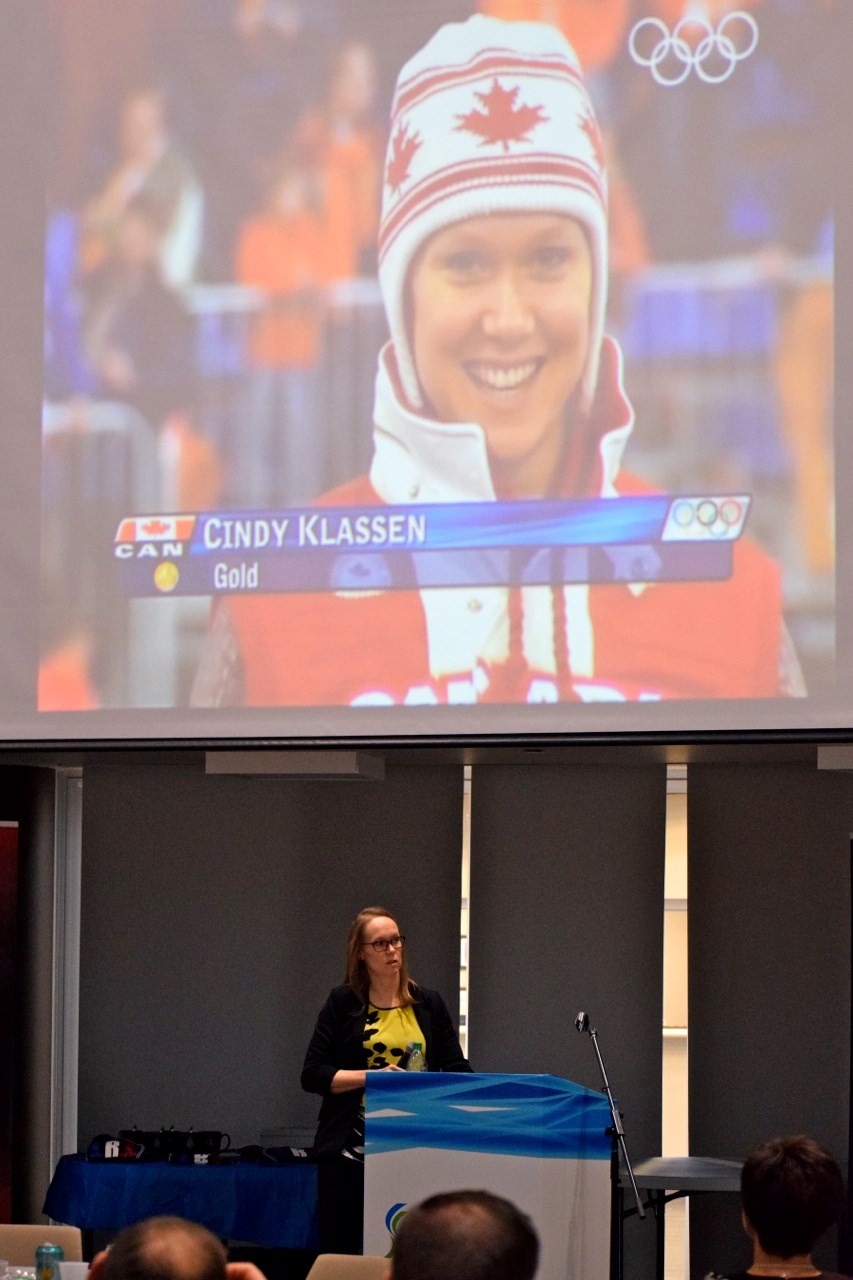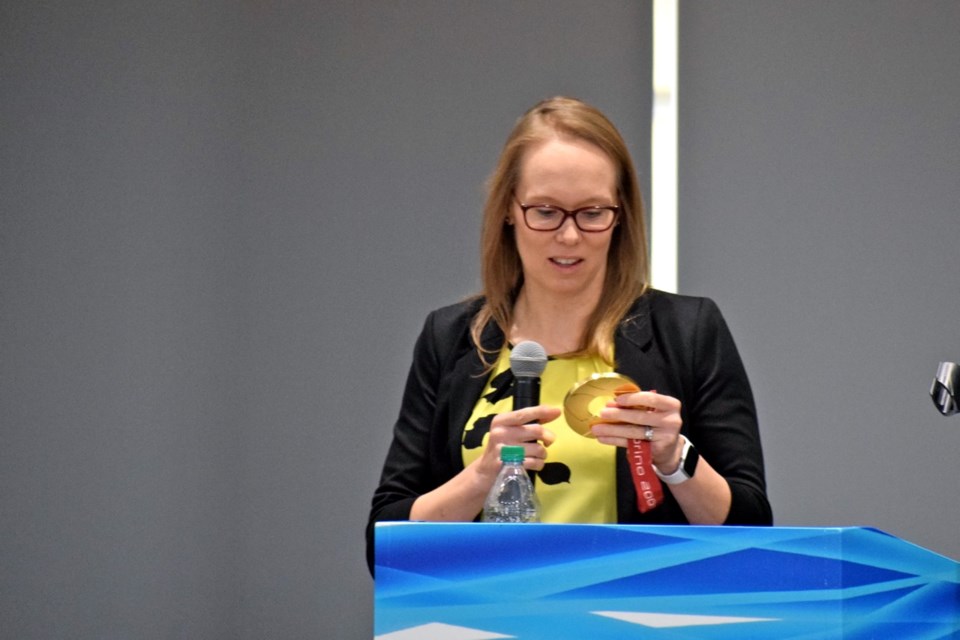It appears that there is a lot in common between the Olympic games and policing routine. But it was Canadian retired long track speed skater and one of the most decorated athletes Cindy Klassen who brought the two together.
Klassen came to Estevan on Sept. 25 to participate in the Saskatchewan Federation of Police Officers 2019 Wellness Conference organized by the Estevan Police Association.
After retiring from speed skating in the summer 2015, Klassen achieved a degree in psychology and fulfilled her childhood dream, joining the Calgary Police Service. While in Estevan, she talked about the resonance between her sports career and experience in the policing world and about some things that are important for wellbeing in both.
Klassen is six-time medalist having achieved one gold, two silver and three bronze at the Winter Olympics. She knows better than many others the feeling of heartbreak and success. Through injuries, achievements, setbacks and personal tragedy, Klassen has learned what it takes to dream big and remain positive in all circumstances.
While presenting in front of Saskatchewan law enforcement, Klassen focused on four main ideas that kept her pushing hard and fulfilling her dreams.
“The first point is to try something new,” said Klassen opening the idea up with the story of how she came to speed skating.
Her original dream was to be a professional hockey player, however, at some point she got cut from the team. And when that door closed, a window opened and it was suggested she try speed skating.
“My first reaction was absolutely not. Because there was absolutely no way I was going to put on one of those tight skid suits, and the long blades just looked funny to me,” said Klassen.
But she went on and tried something new, which ended up paying off.

“Through this whole experience going from hockey to a new sport, speed skating, I really found that big thing that really helped me was that I found this new passion,” said Klassen.
“I think that really helped push me and motivate me. The other thing was that it was a new challenge…. Another thing was just learning… And then there was problem-solving… There were also just the relationships with new people,” said Klassen, then bringing up examples of the same patterns in the world of policing.
The second point was “preparation.”
“A lot of times it would be things like sleep, diet, getting treatment after practice,” said Klassen. “And they are not hard to do, but they just seem so timeless and so easy to let those things slide.”
She talked about the preparation for her first big race in Calgary. She was so nervous that she had trouble sleeping and eating during the week leading up to it.
“I got so bad that the night before the big race my coach… ended up taking me to McDonald's to get some comfort food in me,” said Klassen.
But it was the supporting email she received before the race, followed by an understanding that she’d done everything she possibly could to succeed, that released her nerves and allowed her to go into the race feeling confident. And she won bronze in that race.
Even though she learned the value of preparation, she said in policing work it's still really easy to let such important things as sleep, nutrition or active lifestyle slip away.
She formulated the third point as “let it go.” This life lesson Klassen learned through the months leading to the 2006 Winter Olympics in Torino, Italy, when she was pushing hard to beat German athlete Anni Friesinger in a number of races but was constantly fractions of a second behind. It was only after hours of analysis, thinking and doubting that she came to the conclusion that she was doing her best and she couldn’t control what others were doing, so she let it go. It took several more attempts, but she ended up achieving her goal.
“By taking my mind off of these things that I can’t control I think I really got my eyes opened to the positives,” said Klassen.

She won the gold medal in women’s 1,500 metres speed skating competition, and Anni Friesinger came in fourth.
Klassen pointed out that, same way in policing, it’s important to let go the things officers can’t control.
And finally Klassen talked about “perspective.” She shared the story of her sister getting into a near-fatal accident, which significantly changed Klassen’s life.
“At that point, I realized that even though I still had a lot of races left in the season, I had some big competitions coming up like world championship …I decided that I would finish my season right there … so I had time for my family,” said Klassen.
“Although it’s a tremendous honour to be able to race for Canada, I was so grateful for that opportunity, I really had to remember what’s the most important in life for me… Because my identity didn’t wind into the skating, without hesitation, I was able to take a step back and be with my sister as she recovered.”
And as Klassen was demonstrating her gold medal, she noted that the ribbons were tearing a bit and the piece was wearing out a little, but the relationships that were the most important for her weren’t falling apart. She explained that in a similar manner, in policing it’s vital to keep the identity and relationship outside of the career as life is never limited to work, which sometimes may come to an end unexpectedly.
Klassen left Estevan shortly after sharing her experience and inspiration with the audience, as she had a shift scheduled for the next day.



